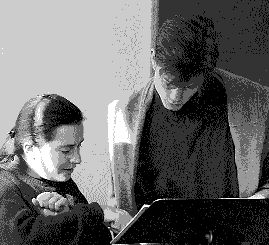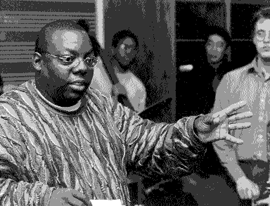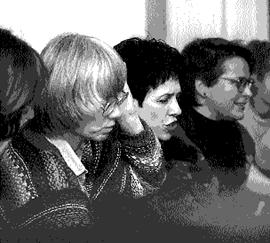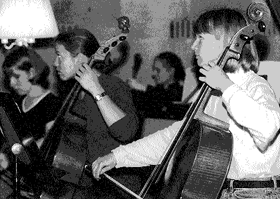|
By Michael Chipman |
|||||
|
"MASTER CLASSES are not uncommon at conservatories and music schools," former dean Karen Wolff has said, "but the tradition of bringing the world's greatest musicians to Oberlin is particularly rich." And so it is. Between September and December 1998, Conservatory students were offered the opportunity to participate in 16 master classes by accomplished performers and music professionals. Offering varied class contents and individual styles, the professionals worked toward the advancement of young musicians to higher levels of artistry and professional development. Featured presenters included Oberlin's quartet-in-residence, The Colorado String Quartet, bassoonist Gyorgy Lakatos, The Kings Noyse, soprano Christine Brandes, Wieland Kuijken on viola da gamba, and jazz percussionist Neal Smith '96. Those who attended master classes by The Colorado String Quartet experienced a uniquely fervid group teaching method. During one master class in October, a student quartet performed the first movement of a Beethoven quartet. At the end of the movement, the four women of the Colorado Quartet literally rushed the students. First violinist Julie Rosenfeld offered an impassioned explanation of why each member of the group must listen to the other three, allowing solo voices to emerge |
evel of enthusiasm and energy to the scene. Both can be equally effective. The quartet has infused our students with a sense of excitement and enthusiasm about chamber music." Jonathan Dexter, a freshman from Burnsville, Minn., who played cello in the aforementioned student quartet had mixed reviews about the master class experience. "I learned a lot from what Diane Chaplin [Colorado Quartet cellist] said to me, but when they were all talking at once, it was hard to get the gist of what they were saying to other members of the group. I would have liked to have heard everything they had to say."
CERTAINLY, CONSISTENT practice combined with regular feedback from an experienced teacher is the best way to transform a student musician into a professional, but most faculty members agree that master classes provide valuable information from other perspectives. "Our students have constant feedback from their teachers," says Irvine, "but exposing them to different ideas is always helpful." Wendell Logan, chair of the jazz studies program, says he hosted Neal Smith for two reasons. "First, Neal is a recent graduate who has a clear perspective on starting a career and working in New York. Second, he endorses products for jazz instrument manufacturers so he can offer students here advice on different ways to create a career." Smith offered two master classes, the first of which dealt with performance. He worked with jazz groups and individuals, with a focus on style and technique. The second Neal Smith master class emphasized career issues. "When Neal graduated |
||||
|
|
||||
|
and then blend back into the ensemble at appropriate times. In mid-sentence, one of Rosenfeld's colleagues completed her sentence, riding the impetus of Rosenfeld's commentary on ensemble performance, and taking the discussion to a new, often louder, level. The other three joined in, each focusing on just one member of the student ensemble until it was virtually impossible for those in the audience to discern any individual dialogue. Rosenfeld says the Colorado Quartet works tirelessly to achieve a unity of sound, and international reviews of their concerts testify to their successes. That unified effort that the Colorado String Quartet brings to performance clearly transfers to the way they teach &emdash; four distinct individuals with one voice. Jeffrey Irvine, director of the strings division, says the Colorado Quartet's dynamic teaching method has been successful at Oberlin. "We have had several quartets-in-residence in the past, all offering unique styles. The Colorado Quartet works from all four sides at once, taking the stage as a group and offering suggestions to help individual players balance their sound within the group." Irvine says there are many ways to conduct a master class. "There are great teachers who are very quiet and reserved, and there are those, like the Colorado Quartet, who bring a high |
three years ago, he started working immediately in New York, both playing percussion and endorsing music products. He has found many different angles to make a career work and we wanted the students to gain from his perspective."
IN FALL 1998, associate dean Laura Kuennen-Poper created the career master class to help students in the transition from student to professional. Presenters thus far have included Karen Wolff, Anton Miller, the Cyrus Chestnut Trio, Jim Snidero, Rachel Barton, Kaffe Matthews, the Colorado String Quartet and Milton Stevens. "Artists here have so much information that frequently goes untapped about much more than how to play an instrument. For instance, their perspectives about the current state of the real world, where art music performance is heading and other insights into what it takes beyond being a superb performer, have been and will continue to be an extraordinarily valuable addition to our students' traditional education." Kuennen-Poper says absolutely everyone, students as well as faculty, should attend career master classes. "We are currently seeing lots of violinists showing up to hear a violinist, jazz students showing up to hear jazz professionals. That's fine, but I believe that many students are missing out by not realizing that there is much to learn from all of these guests, regardless of specific areas of expertise. My background is as a professional violist heavily active in freelancing in Los Angeles, and listening to Cyrus Chestnut, Neal Smith and Kengo Nakamura discuss the scene in New York was a revelation." |
||||
|
|
||||



